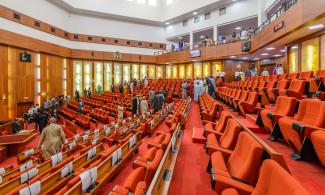
Instead, it resolved to raise an ad-hoc committee to organise a national summit to probe the lingering issue of farmers/herders’ clashes in the country and come up with recommendations for further legislative action.
The Nigerian upper legislative chamber, the Senate has rejected the fresh moves to create grazing routes for cattle rearers in the country.
Instead, it resolved to raise an ad-hoc committee to organise a national summit to probe the lingering issue of farmers/herders’ clashes in the country and come up with recommendations for further legislative action.
The upper legislative chamber made the decisions during the plenary on Tuesday, following the consideration of a motion on the attack and killing of residents in Omala Local Government Area of Kogi State allegedly by herdsmen.
Moved by Senator Isah Jibrin (APC, Kogi East), the motion was rowdily rejected.
The Senate, which observed a minute silence in honour of those killed in the area, mandated the National Emergency Management Agency (NEMA) to provide relief materials to those affected in the local government and now living in IDP camps.
According to Daily Trust, the Senate also rejected an additional prayer by Senator Mohammed Tahir Monguno (APC, Borno North) who sought the Federal Ministry of Agriculture and Food Security to create new grazing routes in the country as a way of resolving the issue of framer/herder clashes.
According to Senator Monguno, the creation of grazing routes would prevent cattle from grazing on farms and thereby avoid conflict between farmers and herders.
In his contribution, Senator Ahmed Lawan (APC, Yobe North), canvassed for the federal government to pay subsidies to herders who had lost their cattle to rustlers.
Lawal, a former senate president said, “There is nothing wrong for the federal government to provide subsidy for herders who have lost their cattle to rustlers.
"This is a security issue as much as it is an economic issue. We should say it as it is because we are looking for solutions. We must continue to protect the lives and property of our citizens, which is the essence of governance.”